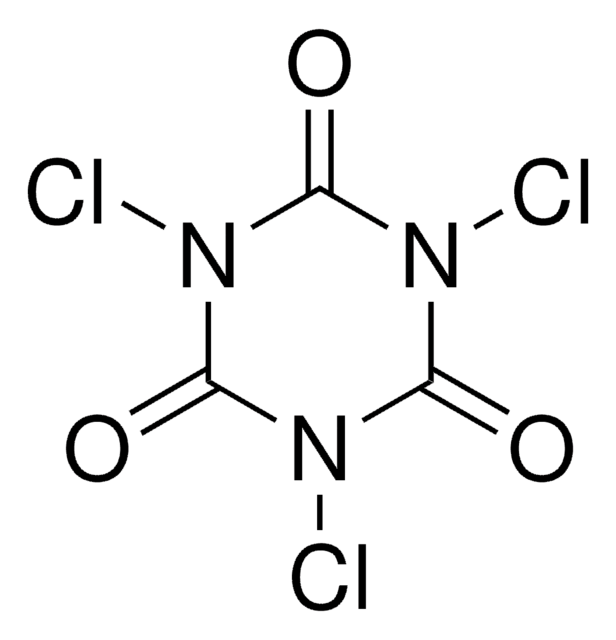8.08607
Trichloroisocyanuric acid
for synthesis
Synonym(s):
Trichloroisocyanuric acid, 1,3,5-Trichlorohexahydro-1,3,5-triazine-2,4,6-trione, 1,3,5-Trichloro-1,3,5-triazine-2,4,6-trione, TCCA, Bleaching solution
About This Item
Recommended Products
Quality Level
form
crystals
potency
406 mg/kg LD50, oral (Rat)
>2000 mg/kg LD50, skin (Rabbit)
pH
2.0-2.7 (20 °C, 10 g/L in H2O)
mp
225-230 °C (decomposition)
transition temp
flash point >250 °C
density
2.07 g/cm3
bulk density
850 kg/m3
storage temp.
2-30°C
InChI
1S/C3Cl3N3O3/c4-7-1(10)8(5)3(12)9(6)2(7)11
InChI key
YRIZYWQGELRKNT-UHFFFAOYSA-N
Application
- Catalyst- and metal-free C(sp2)–H bond selenylation of (N-hetero)-arenes using diselenides and trichloroisocyanuric acid at room temperature: An eco-friendly approach for the C(sp2)–H bond selenylation of imidazopyridines and other N-heteroarenes as well as simple arenes at ambient temperatures (JSS Neto et al., 2023).
- Organic impurity profiling of 3, 4-methylenedioxyamphetamine (MDA) synthesised from helional: This paper explores the use of trichloroisocyanuric acid in the oxidative rearrangement reaction for synthesizing MDA, presenting an alternative oxidizing agent approach (AL Mercieca et al., 2023).
- Convenient synthesis of 2-chloro-3-substituted quinoxalines by visible-light-induced radical cascade cyclization of ortho-diisocyanoarenes with sulfinic acids: This research discusses the use of trichloroisocyanuric acid as a Cl-source in visible-light-induced reactions, enhancing the synthesis process (P Natarajan et al., 2024).
- Synergy between UV light and trichloroisocyanuric acid on methylisothiazolinone degradation: The study presents an advanced oxidation process using ultraviolet and trichloroisocyanuric acid for the degradation of MIT, detailing performance, kinetics, and pathways (Z Chai et al., 2023).
Analysis Note
Identity (IR): passes test
Signal Word
Danger
Hazard Statements
Precautionary Statements
Hazard Classifications
Acute Tox. 4 Oral - Aquatic Acute 1 - Aquatic Chronic 1 - Eye Irrit. 2 - Ox. Sol. 2 - STOT SE 3
Target Organs
Respiratory system
Supplementary Hazards
Storage Class Code
5.1B - Oxidizing hazardous materials
WGK
WGK 2
Certificates of Analysis (COA)
Search for Certificates of Analysis (COA) by entering the products Lot/Batch Number. Lot and Batch Numbers can be found on a product’s label following the words ‘Lot’ or ‘Batch’.
Already Own This Product?
Find documentation for the products that you have recently purchased in the Document Library.
Customers Also Viewed
Our team of scientists has experience in all areas of research including Life Science, Material Science, Chemical Synthesis, Chromatography, Analytical and many others.
Contact Technical Service


















